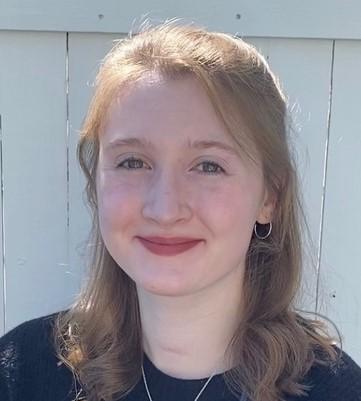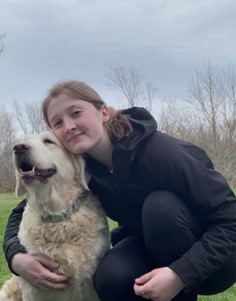
Our first “Spotlight” interview of Epilepsy Awareness Month shines on Chloe O’Brien, RN, one of the nurses in the epilepsy pod of our 1L Clinic. O’Brien talks to us about the compassion and words of kindness she experienced inspired her to follow nursing at an early age. She shares how that passion grew when she connected with people living with epilepsy, and how she hopes to help and learn from every patient she meets.
O’Brien also talks about the variety of resources that are available to help epilepsy patients and their loved ones life a better, fuller life with epilepsy. Finally, she shares her loves of reading, writing, traveling, and her hopes for writing and illustrating a children’s book when she’s not at Duke.
What are your current responsibilities at Duke and our 1L Clinic? What does a typical work day look like for you?
My typical day can vary depending on my provider assignment and how many patients they will be seeing. An important responsibility includes completing intake/vitals for my assigned provider in a timely manner, assessing patient concerns, and notifying the provider of these concerns. My goal is to maintain patient safety and ensure their needs are met at the appointment. In between rooming patients, we complete prior authorizations, medication refills, contact patients, handle faxes/paperwork, and call pharmacies/insurance companies.
A lot of our patients have significant comorbidities or social circumstances that have an impact on their quality of life and their treatment plan. I try to gather as much information as possible to gain an understanding of the entire situation so providers are able to determine next steps and recommendations when the message reaches their inbox.
Since starting at 1L, I was oriented into the epilepsy/sleep pod right from the start. This allowed me to establish a strong foundation and become familiar with not only our providers, but this patient population to be able to triage their concerns, contact them to discuss their messages, and provide education when necessary. In the epilepsy pod, I’ve had the opportunity to learn about population specific medications, specialty meds, treatment plans, and the prior authorization process.
We help to ensure patients have access to their medications and assist patients/caregivers navigate the world of insurance to hopefully lessen that burden for them. With the creation of pods, this has allowed us to become more specialized and learn how to promptly provide this aspect of patient care. We have amazing providers here at 1L and I’ve had the pleasure of working more closely with the epilepsy division. I feel very lucky to work with such wonderful epilepsy providers that I can go to with questions or concerns.
How did you decide nursing as a career? What brought you to Duke and to our 1L Clinic in particular?
My journey to becoming a nurse undeniably started early on. I had several personal experiences at a young age with truly amazing healthcare providers who piqued my interest in nursing and inspired me to pursue this as a career. Even to this day, their compassion and words of kindness have stayed with me years later and have fueled my desire to provide the same level of care for others.
My interest in neurology as a specialty definitely solidified in nursing school. I always found myself wanting to learn more about the brain in particular and found it fascinating just how interconnected everything is. It is irrefutably such an extraordinary, yet complex, organ that is the basis of the entire human experience. My time on the neurology floor was incredibly rewarding as well. Being able to see firsthand what I was studying, meet people with these diagnoses, and see how their treatment plan improved their quality of life gave me even more of an appreciation for this field.
When I interviewed for this position at Duke, the clinic had just newly established the pod system. Each subspecialty in the clinic has two or three nurses within their pod. At the time, there was an opening in the epilepsy/sleep division and I was immediately interested. Prior to starting here, I only had a handful of experiences caring for patients with epilepsy – but they stuck with me.
I remember having the opportunity to care for one patient in particular. He had epilepsy along with other comorbidities that resulted in a lengthy hospital stay. I was with him for multiple shifts, so this allowed me to follow his care. He was nonverbal, but able to use gestures as a form of communication and his family was always present at the bedside.
I learned so much about the lived experience of the patient and their family – including both the good and the bad days – and felt like I was able to get to know his story beyond his acute hospital stay. In my time here at 1L caring for patients with epilepsy, I have developed such a passion for working with this population and have learned so much from both our patients and providers.
What’s one thing you wished more people living with epilepsy and their loved ones knew?
All of the resources available to them! This can look and mean something completely different for each person depending on their needs. Maybe a caregiver is unsure of how to use the prescribed rescue medication or possibly the patient needs help with accessing medications through patient assistance programs or copay assistance.
Others may need help with a social situation that could be exacerbating their condition by acting as a provoking factor. Depending on their circumstances and what their personal goals are, there are so many people and helpful resources in place and patients often just need assistance finding the right place to start.
What do you enjoy most about your work?
I truthfully enjoy every aspect of my work. My goal coming into the outpatient world was to be able to follow patients through their entire health journey to build connections and familiarity. Especially within the epilepsy pod, I am so happy to have had the opportunity to see patients come back for their follow up appointments with our providers and get to know them. That has been the most rewarding part for me.
It’s always nice to call a patient or send them a message and they remember me from their visit. I hope it also helps them feel more comfortable relaying their concerns and needs. I truly enjoy talking with people, hearing their stories, and helping in any way I can. If I’m able to have a positive impact on their day, then I’ve met my goal.
What’s the hardest part of your job?
If I had to pick the hardest part of my job, it is likely trying to get answers from insurance companies. Seizure medications are always urgent prior authorizations and we want to ensure the patient does not have a lapse in access to their medications.
What other passions or hobbies do you have outside of the Department?
Outside of work, I have enjoyed exploring and seeing what the area has to offer since moving down here to Durham. I’ve met amazing people and have had lots of fun visiting different cities. I still have so many places and things to do on my list that people have recommended. My Mom actually just recently moved down to Wilmington from Vermont, so it’s been nice to have her within driving distance to take a quick road trip to the ocean to visit her and the dogs. In my spare time, I enjoy drawing, reading, writing, listening to music, and have an interest in photography. I hope to one day write and illustrate a children’s book!
